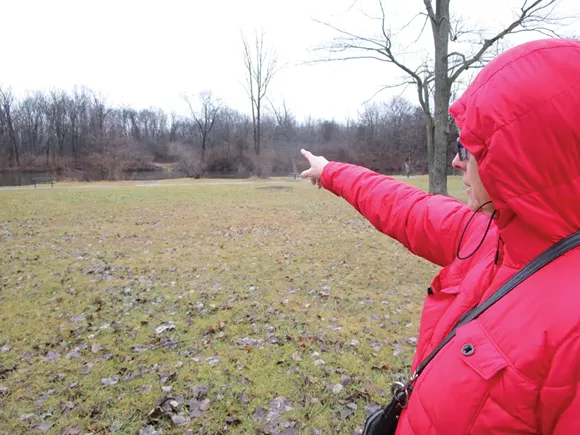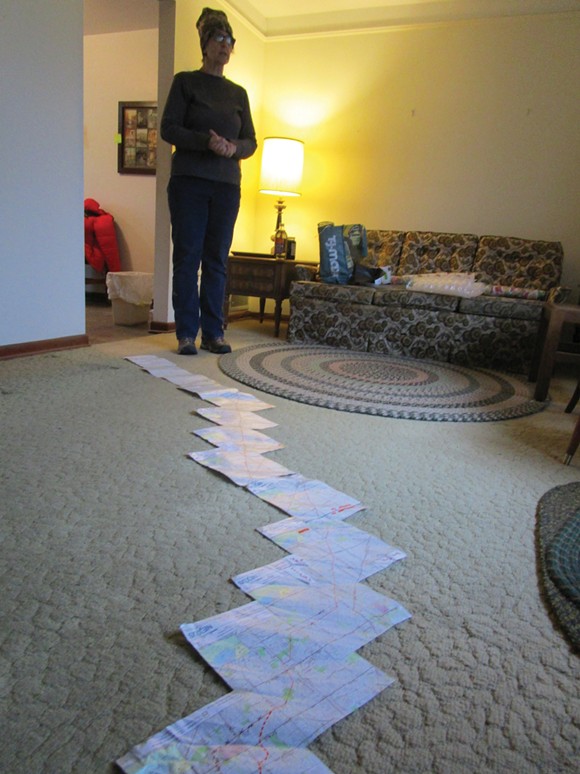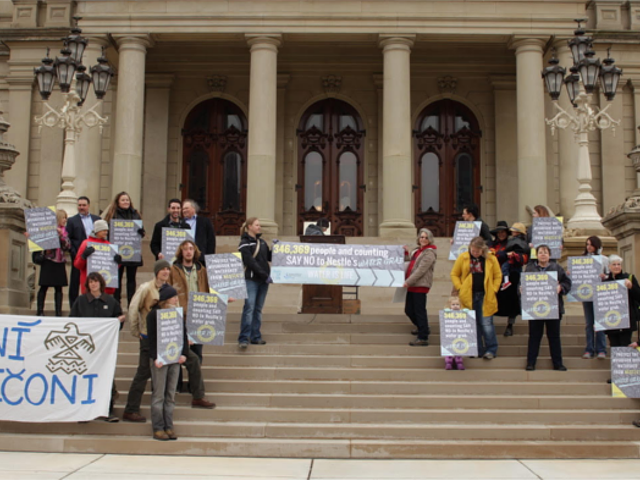Kathy Schoen is making one last visit to her elderly aunt's house, packing up the final few things before a new owner gets the keys. That leaves plenty of room on the living room carpet for her to unspool a map of 50-odd miles of the proposed Nexus pipeline's route — and the map shows the pipeline going within 70 yards of the house.
Remarkably, Schoen's aunt isn't leaving because of the pipeline — she finally considered the house a poor fit in her advanced years — but she'll get a better price now than if selling after the pipeline is put in.
"Her house wouldn't sell for half. She's very lucky she got out of this house," Schoen says. "The pipeline is going to be right over that fence. Isn't that crazy?"
Scrolling further down on the map — printed out and hand-assembled from a Nexus website — she points out where the pipeline crosses her family's centennial farm, which has been in Schoen's family for more than 130 years. Between her aunt's house and her Augusta Township property, Nexus has been a double-whammy that prompted the 60-year-old activist into motion.
Schoen says she wasn't spoiling for a fight. She had resisted selling the family farm after her father died a decade ago, but after a tenant left in 2014, and with her kids starting families of their own, she was prepared to move out to Kalamazoo County.
"And then this hit," she says.
"I think I got my first notice in June or July of 2014," Schoen recalls. "It said, 'We're the Nexus pipeline, and we hope to be able to gain access to your community for a natural gas pipeline. Your property could very well be in the survey area, so we need permission to survey.' So I called them and I said, 'Are we talking about a line running down Willis Road to service homes?' And they wouldn't tell me. They said, 'Well, we can't tell you right now. But we'd appreciate you signing the survey releases so we can survey your property.' So I said, 'Hell no.' I wrote it on there and sent it back. And then the phone calls started coming."
In November of that year, Schoen attended a Nexus open house for impacted landowners and found out just how big the pipeline would be and how close it would come. On a company map, Schoen found her property "right in the bull's-eye."
She laughs, recalling the cheery Nexus staffers trying to get landowners to sign permission forms right at the event.
"They were like, 'Here's a mug with Nexus on it! This is a wonderful thing! We need clean natural gas!'"
Schoen was in disbelief. She had been working with Let's Ban Fracking, trying to get a ban on horizontal hydraulic fracturing for natural gas on the Michigan ballot. "I just looked at him and said, 'No, no, no, no, no. I'm never gonna let you survey. I'm not going to sign. I'm not doing this,'" she says.
Had she known then what she knows now, Schoen says, "I would have stood up that night on the steps of that auditorium and gone, 'I'm a landowner, I'm opposed. Anybody opposed, we need to all meet right now so we can share information and fight this thing.'"
Ever since, Schoen has been knocking on doors, attending community meetings, and campaigning to get township boards to oppose the Nexus pipeline. And it's paying off: Already Augusta Township and Ypsilanti Township have passed resolutions against Nexus. It's a fight that ranges from the big ecological nonprofits to emotional township meetings to direct action on Schoen's own posted private property.
Of the stakes she finds on her property, Schoen says with a laugh: "They can stake things. I keep pulling them out."
The pipelines faced by Schoen and others in Michigan have their source in Ohio and Pennsylvania, where the process of hydraulic fracturing is allowing drillers to shake deep deposits of oil and natural gas to the top. These newly accessible resources have set off a bonanza of pipeline-building, as energy giants look for ways to profitably exploit a rapidly changing North American market for hydrocarbons.
But as critics see it, this pipeline-building spree is an under-regulated, speculative bonanza in which residents end up having to pay a high price for a system of questionable value when it's all built.
That's partly due to a lack of robust regulation, which is the responsibility of the Federal Energy Regulatory Commission, or FERC (rhymes with "lurk"). FERC has been under increasing fire for being a "rubber stamp" commission. As Schoen puts it, "The word is that FERC has never met a pipeline it didn't approve of."
Nancy Shiffler, the chair of the local Huron Valley Group of Sierra Club, phrases it more delicately, noting that while "FERC is supposed to balance the public necessity for this pipeline against adverse impacts," the commission "does not easily turn down any permit application."
As Shiffler sees it, Nexus and another pipeline following the same path — the ET Rover — are not only not needed, but harmful. "We believe in both cases there are adverse impacts that are not outweighed by any public value," she says.
What makes lax regulation of the pipeline companies chasing new profits especially troubling is that when FERC grants approval, as a federal agency, it allows private companies to invoke the power of eminent domain. Which means a company has a potent weapon to use in court proceedings against people, even governments, reluctant to allow a pipeline on their land.
The fact that such broad powers could be conferred on Nexus has critics especially fired up because it's widely believed the gas will simply be reshipped to Canada, to the Dawn Hub across from Port Huron, for sale in Ontario and beyond.
One of the people who've arrived at that conclusion is Frank Zaski, a retired auto executive who spent years in market research and economic and sales forecasting. He's helped the Sierra Club with research and number-crunching, and he also has a knack for putting the whole situation in layman's terms:
"Rover and Nexus both said, independently of each other, 'Hey, there's all this demand [in Canada]. We're going to supply it and make a whole lot of money.' But the Dawn Hub has declined in importance because much gas is going into Canada through Niagara Falls and further upstate in New York. Demand for gas from the Dawn Hub has dropped in half, according to environmental agency statistics."
Zaski isn't the only person to point out that Nexus part-owner DTE Energy's own forecast doesn't see the pipeline as profitable until the 2030s, and even then it supposes no additional pipeline capacity being built, and doesn't account for falling use of natural gas in Michigan.
"We're getting more efficient," he says. "We have more weatherized homes than 20 years ago. Industrial, commercial, residential usage is trending down. And then there's energy efficiency and renewable energy. You go to a store and really the only selection of lights is LED now, which are 90 percent more effective than the incandescent light bulbs eight years ago. Refrigerators, everything is 50 percent more efficient, so this all helped. Instead of going up 3 percent a year as forecast, it actually has dropped between a half percent and 1 percent a year, and it's going down."
Given the way critics like Zaski see the pipeline as an unprofitable, speculative gambit to sell gas to another country, it's clear why they oppose the way Nexus brandishes its eminent domain powers.
"You can't use eminent domain if it's not for the public good," Shiffler says. "And if that's true that [most of the gas will go] to Canada, then it's not for the good of the people of the United States."
More troubling still are several cases before the Michigan Public Service Commission in which DTE Energy is seeking guarantees that, should the line not be profitable, it can pass the costs of building Nexus on to DTE ratepayers.
"I think there's a whole question of is this really going to be financially viable or not," Shiffler says, "and in the case of Nexus and DTE, DTE customers could end up having to basically pay for something that isn't going to be viable."
Or as Douglas Winters, counsel for Washtenaw Township, puts it, "It's kind of like, 'Not only are we going to threaten you with eminent domain proceedings if you don't give us an easement, by the way — you're going to pay for it.' So the whole thing is just not a process that I think at times really is for the purpose of what eminent domain is for. We all understand you have to have eminent domain to construct a highway or a hospital, things that really have a public purpose. I'm not really sure how I feel it fits into a public purpose when you're basically going to do the fracking, transport the gas, and, by the way, send it over to Canada. I don't think we should be paying for that."
While opponents of the Nexus pipeline can articulately discuss the project's lack of public benefit, the actual harm it does is what most people will be curious about. Yes, high-pressure gas lines can rupture, spewing huge fireballs that can burn out of control and incinerate everything within 1,000 feet or more. But much of the damage takes place with the installation of the pipeline, as work crews, made up of mostly out-of-state workers, run heavy machinery, pulling out trees, digging trenches, and leaving a moonscape in their path.
Shiffler explains that not only do trees have to be taken out, the right-of-way has to remain clear, which leads to fragmentation of forested areas. On farmland, there are concerns about how digging trenches and laying pipes affects drainage tiles. Pipelines crossing wetlands, streams, and rivers present worries about potential filtration and erosion problems during and after construction.
But the risk of a pipeline turning into an inferno of flames is a very real one. And these events are at their most lethal when passing through populated areas. Experts say a leak and explosion on the high-pressure Nexus pipeline could create an "incineration zone" with a radius of 1,000 to 1,250 feet. Note well that this pipeline is planned to go within 50 to 100 feet of homes and other structures.
"What are the chances that it would explode? Pretty slim," Schoen says. "But they do say that even the best-laid pipe leaks amounts of methane and it's not good to breathe it. And if you live someplace where they've got these regular stations where they release pressure, that's all going in the air. You want to live downwind of that?"
But what worries Schoen more than loose pipeline joint are the tight lips of Nexus officials.
"You ask Nexus about that, they won't tell you," she says. "If it's running at full capacity, that 1.5 billion cubic feet per day, a high-pressure pipeline. But they say, 'Well, it might not be running at full capacity, and so then the blast zone wouldn't be as large.' ... They don't tell you any more than they want to tell you."
It doesn't help matters that the pipeline company would prefer not to odorize the gas as it enters densely populated areas. Because Ypsilanti Township is designated as an urban area, odorization of the gas — that nasty smell the public is taught to associate with natural gas — is required under federal rules.
That issue seems to be something the company would rather not discuss. Township attorney Douglas Winters says that the township board of trustees' supervisor, Brenda Stumbo, received a letter from the Sierra Club last year that alerted her to Nexus' request for an odorization waiver.
"Each time she asked them, 'Have you filed for a waiver?' they would look at her like they didn't know what she was talking about," Winters says. "As it turned out, not only did they know what she was talking about, they knew it as far back as January of last year when they first submitted the waiver request to begin with."
Winters says Nexus has not been transparent. "If you file for a waiver, just tell me yes or no," he says. "If you say, 'No, I didn't,' then fine, or if you say, 'Yes, I did,' OK, then we can argue about whether or not the waiver is granted. But when you don't want to give me an answer at all, when you feign that you don't know what I'm talking about, when you're not forthcoming on that issue, why should I trust you on anything else?"
It's this lack of transparency — from bright and cheery form letters asking people to sign away their rights to carefully managed dog-and-pony presentations to facetious negotiations — that makes people like Winters say negotiations with Nexus simply aren't in good faith. In fact, he makes a strong argument that Michiganders have seen so many examples of breach of public trust that the people's confidence in promises made about infrastructure is strained to the breaking point.
"All I know right now is this: When someone says, 'Trust us, this is safe,' I can point to the city of Flint. They said, 'Trust us.' I can point to Macomb County, where they have a sinkhole they're saying is going to cost $100 million to repair ... because at one point in time, somebody said, 'Trust us,'" Winters says. "So nobody has any reason to trust that the pipeline is not going to leak, and to somehow grant a waiver that potentially compromises the public's health and safety, that's not good government, and they should not be allowed to do that."

Though not a single shovelful of dirt has been moved to dig in this pipeline, tremors are already being felt along its proposed pathway from here to Ohio. Nexus would mean not just increased danger, but increased noise pollution at DTE Energy's compressor station, just northeast of Willow Run Airport. Observers have pointed out that, on some days, it's already quite loud, and should only be louder after its planned 30 percent expansion. Across Rawsonville Road is a good-sized trailer court, with dozens of homes within the blast radius.
From there the route runs under US-12 and onto the old GM Powertrain site, presenting multiple worries. First there is the toxicity in the soil, which has hosted heavy industry since the days of the famous bomber plant. "It's basically a toxic site," Shiffler says. "So there's concern there that, if it's constructed in an area where there's a lot of pollution, what happens when they're digging that out?"
Another concern is that the American Center for Mobility, Michigan's testing area for autonomous vehicles, broke ground on the site in November. The research area is scheduled to be completed this year, and yet maps of the Nexus route obtained by activists show the pipeline running through the site, and a large staging area where a constructed environment for vehicle testing is supposed to be.
"That has to be opened by Dec. 1 of this year," Winters says. "That's a national testing center to test autonomous vehicles. Nothing can derail that timeline ... The car companies are spending billions of dollars investing in this technology for the future, and we want to be the place where everybody comes to test their autonomous vehicles, and Nexus cannot mess that up."
The route then heads south beneath the 200-foot-wide median of Wiard Road, putting hundreds of homes in Ypsilanti Township's West Willow neighborhood within the blast radius.
The majority-minority neighborhood of West Willow has faced tough times, and was hard hit by 2008 foreclosure crisis, saw spikes in crime, but the township remained committed to helping bring back the neighborhood, which has seen crime drop and home values rise.
One organization pushing that rebirth is the New West Willow Neighborhood Association, a nonprofit organization headed by longtime neighborhood resident Jo Ann McCollum. "Our housing value is not as high as other areas, but it is increasing," McCollum says. "Our crime rate went down last year 163 percent, so we are very happy about that. We work with the township, we work with the Washtenaw County Sheriff's Office, and we're going to work with them again this year."
Given the area's rising home values and a trickle of new residents interested in getting deals on homes in a neighborhood on the upswing, the proposed pipeline is anything but good news for residents.
"People are concerned about how close it is," she says, "in fear that if something that actually happens, that we are in the area where, if we're lucky, we can get evacuated quickly."
The association hosts regular meetings, and McCollum says they generally draw good crowds. "We've had a few presentations at our meetings, and they've said that there are a lot of pipelines that are out there, so why are they putting in more?" she says. "Some of the neighbors have commented that this is unnecessary, this is just a way to make money."
McCollum says she's aware of residents worried that the pipeline will cause home values to drop.
One of those residents is 64-year-old Ceola Robinson, who lives less than a half-mile from the proposed route, definitely within evacuation zone. She's not only worried about an explosion, but what will happen to her home values.
"I'm concerned about the value of my property," she says. "With the excavations and whatnot, they're going to start restructuring the roads right around my neighborhood. And nobody has explained to use how all that will affect the neighborhood."
Robinson's house is paid off, and she's retired, living on a fixed income. But even as she's worried about what Nexus could do to her property, she says she'd have a hard time leaving somebody else holding the bag.
"I figured I'd be comfortable retiring in my neighborhood," she says. "But I'm in a bind. I'm ready to move, but I have a conscience. I wouldn't want to sell my house to somebody when they don't know what's going on here. So I guess I'm just stuck."
She also makes the point that, for low-income people, "life is difficult as it is without having to be at every township meeting, check every website, and try to understand who's telling the truth and who's working in their own interest."
Robinson apparently isn't alone in apprehension about the proposed pipeline. As McCollum puts it, "I haven't had one person express that they want to see it coming and they welcome it."
After passing by West Willow, the route jogs slightly east, passes under I-94, and then comes out in the subdivision where Schoen's aunt made her home. Quietly, some of the homes are being sold at their current value before the pipeline goes in.
"See those three stakes?" Schoen asks. "Those are Nexus stakes. So it's going right next to these people's garage. And they sold." She laughs sardonically as she says, "I knocked on their door. What did they do? They listed their house and sold it."
Speaking of the nearby condominium development, Schoen says, "The people in the condos didn't know about the pipeline. I knocked on doors there." In fact, one older resident burst into tears when she heard the pipeline would pass through the nearby park she visits all the time.
Then she points out a tenant across the street who can't simply sell and relocate: the owner of the Throw Shop, a disc golf course at Grove Street and Bridge Road.
"He's a young guy," Schoen says, "and I've seen his wife just cry at meetings, because they're thinking, 'What's going to happen to our business?'"
The owner, Ben Calhoun, says, "It's definitely going to hurt business. I don't know if it's going to hurt enough that it could put us under."
Calhoun says the pipeline is going to come through on the back end of the property off Bridge Street, closing off about 150 feet by 700 feet of the course, which partially impacts or completely closes up to eight of the holes. "Four or five of them will be completely closed off, and two or three of them will be partially impacted by the construction," Calhoun says. "And when they're done, they would have torn down every single tree in that zone."
For those who aren't avid disc golfers, it's worth noting that disc golf courses need trees as obstructions, so throwers can make those challenging shots that bank up at an angle around an obstacle.
"So the holes would be completely, permanently destroyed. ... I mean, there's no point in putting those holes back in the ground," he says. "We can't just take a hole that had three or four trees on it and put it back in the ground as a wide-open shot with nothing anywhere."
Calhoun is one of the more engaged township residents in the path of Nexus. Every time the subject appears on a township agenda, he'll make the meeting, as he puts it, "Another day of my life wasted." That said, he offers some keen insights.
"The whole project is completely unnecessary. The same companies will tell you if you read their documents, the pipeline is not actually needed at the moment and they don't expect it to be needed until at least the year 2030," he says. "They're only building it now because they have the political power to build it now, and they know that they're not going to be allowed to build such terrible projects in 15 or 20 years because people are going to stop them at that time, when people stand up and have more political say."
Running south from Calhoun's course, the route passes within 400 feet of Ford Lake before crossing the road onto one of Ypsilanti Township's premier recreational areas, North Hydro Park, sited on a bend in the Huron River just downstream of the hydroelectric dam that backstops the lake. In a significant feat of engineering, the pipeline will have to dive under the Huron River, then run under the bank north of the park's peninsula. It's a job that will involve permanently tearing out a 50-foot-wide strip of trees 1,200 feet long for right of way, before the route arcs southward again for about another 1,000 feet climbing to the top of the bluff on the south where it will skirt South Hydro Park. As much as two and a half acres of land would be permanently denuded of foliage.
"Going down a farmer's field, that ain't nothing," Schoen says. "Going under this is going to be a major undertaking."
The use of eminent domain to route the pipeline through the recreational areas is something the township board of trustees is especially concerned about. The board's Monica Ross-Williams says, "We have a lot of concerns, ourselves and our residents. No. 1 is that the proposed pipeline would be going under a section of the Huron River that connects into the Ford Lake basin, which is a premier lake basin inside Ypsilanti Township. It's also location to a number of parks in the area. Also, there's a concern because of the protected status of wildlife inside of the area."
Another concern was that pipelines demand large amounts of water — tens of millions of gallons of it — for pressure testing. It's likely the route's proximity to Ford Lake was in mind when Nexus officials asked the township if they could draw water from Ford Lake in the summer of 2016. The township refused.
From the township parks, the route jogs east and west to the south, skirting the few subdivisions before more or less arriving in a predominantly rural area. While the problems diminish with fewer people, they are still significant.
"On farmland, on a couple of concerns crop up," Sierra Club's Shiffler says. "One is that even though they say they will restore the soil to what it was before, there's pretty good evidence that the productivity of the soil in the pipeline right of way is not what it was prior to the installation of the pipes."
When it comes to restoring the health and tilth of soil, Schoen says she may even be even less lucky. "Paint Creek is on our western border, and when it gets down our way, it's pretty small. But we're only 5 feet above the water table. And two years ago, we couldn't plant crops on the field because it was under water until well into the end of June, which is past planting season. So my fear is, on top of all this, if FERC grants the right to do this and we have a wet year, they're going to have to de-water our property. It sounds like they drive big steel sheets in at angles, and they pump the water out, and it's just going to be even worse. It won't ever be the same."
But it isn't just the land that's threatened or the forest that's fragmented by a pipeline coursing through. It changes the tenor of the community, as properties change hands in anticipation of the big job. "People all along this route have been dumping homes and then the people that buy them have called me," Schoen says. "One woman said, 'We just signed the papers and within the month we just hear that there's a pipeline that's going to go through our property.' And I said, 'I would see if they were required to disclose this in the seller's agreement.'"
But one of the biggest sticking points for locals is where the route passes within 200 feet of Willis and Whitaker roads, putting Lincoln Consolidated schools within the blast radius.
As the pipeline slinks through Monroe County and into Ohio, the objections only become more full-throated, as the pipeline passes through plenty of developed area in that state.
According to the Cleveland Scene, a York Township, Ohio, resident posted a sign outside his home: "No Trespassing: Due to the High Cost of an Attorney and our Lack of Patience, WE SHOOT TO KILL!" Another Ohio citizen posted a video of a standoff with land surveyors, which ends with a quote from President John Adams: "The moment the idea is admitted into society that property is not as sacred as the law of God, and that there is not a force of law and public justice to protect it, anarchy and tyranny commence."
Back in the Ypsilanti area, where nothing more powerful than a resolution has been brandished, the situation is still enough to make people like Douglas Winters fume.
"There are hundreds of thousands of miles of pipelines to transport gas, OK? So of all the places you got to pick to put this damn pipeline, you're going to put it right through this national testing facility we only have one chance to get in place, through the township park, and you're going to have all these conflicting construction schedules, and, by the way, we're going to pay for it, and, on top of that, you don't want to odorize it. Aside from that, I guess it's a good thing."

For an activist waging a battle, Kathy Schoen seems strangely serene as she patrols her centennial farm with her little dog on this chilly winter afternoon. Between the mounting pressure from the officials, the threats of eminent domain, and the rising offers of payment for her land, every moment of peace and equanimity is hard-won.
"They just called me yesterday," she says of the Nexus people. "They weren't supposed to — I've got an attorney that's fielding calls — but they're just relentless in wanting this. I know they started offering $30 a linear foot. And I hear now in places they're up to $300 a linear foot. Now you're talking some money. They're offering more. I told them I didn't want to hear it. At this point I think we're just going to let them take it with eminent domain and have our day in court and say, 'You're going to have to take my property, because I'm not selling it.' But it's hard, because when you hear about people getting $200 or $300 a linear foot, and you've got 1,500 linear feet, at least you're getting something back, because what you're losing is a tremendous amount of money, depending on where this pipeline is and what you had planned for that soil."
Walking the same soil her great-grandfather did 130 years ago, she says the right-of-way guy had told her, "You know, we're going to take it with eminent domain if you don't sell, and the prices have really gone up. And I know I'm supposed to be talking to your lawyer, but, you know, I really like you."
Schoen bursts into laughter. "Yeah, right."
Instead, Schoen tried to make a deal. She said if he could give her what she wanted, she would sign the papers.
"And he said, 'Oh, what do you want?'
"I said, 'I want the last two and a half years of my fucking life back!'
"He didn't say nothing. So I said, 'So I guess I'm just out of luck, right?'"
This story has a companion piece in our sister paper, the Cleveland Scene. It can be found at clevescene.com.







